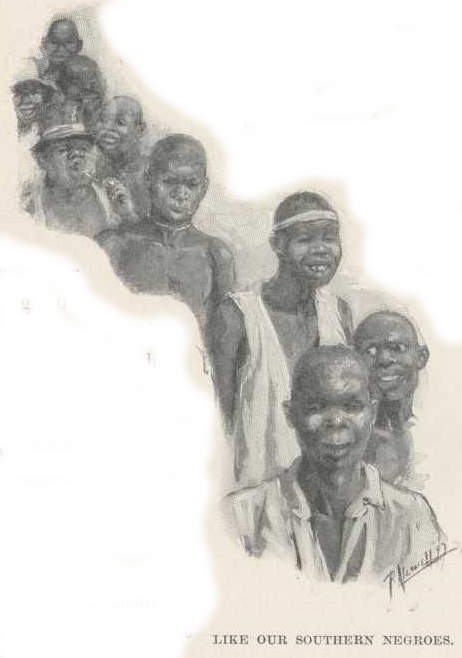Monday, May 4. Steaming slowly in the stupendous Delagoa Bay, its dim arms stretching far away and disappearing on both sides. It could furnish plenty of room for all the ships in the world, but it is shoal. The lead has given us 3 1/2 fathoms several times and we are drawing that, lacking 6 inches.
A bold headland—precipitous wall, 150 feet high, very strong, red color, stretching a mile or so. A man said it was Portuguese blood—battle fought here with the natives last year. I think this doubtful. Pretty cluster of houses on the tableland above the red and rolling stretches of grass and groups of trees, like England.
The Portuguese have the railroad (one passenger train a day) to the border—70 miles—then the Netherlands Company have it. Thousands of tons of freight on the shore—no cover. This is Portuguese allover—indolence, piousness, poverty, impotence.
Crews of small boats and tugs, all jet black woolly heads and very muscular.
Winter. The South African winter is just beginning now, but nobody but an expert can tell it from summer. However, I am tired of summer; we have had it unbroken for eleven months. We spent the afternoon on shore, Delagoa Bay. A small town—no sights. No carriages. Three 'rickshas, but we couldn't get them—apparently private. These Portuguese are a rich brown, like some of the Indians. Some of the blacks have the long horse heads and very long chins of the negroes of the picture books; but most of them are exactly like the negroes of our Southern States round faces, flat noses, good-natured, and easy laughers.
Flocks of black women passed along, carrying outrageously heavy bags of freight on their heads. The quiver of their leg as the foot was planted and the strain exhibited by their bodies showed what a tax upon their strength the load was. They were stevedores and doing full stevedore's work. They were very erect when unladden—from carrying heavy loads on their heads—just like the Indian women. It gives them a proud fine carriage.
Sometimes one saw a woman carrying on her head a laden and top-heavy basket the shape of an inverted pyramid—its top the size of a soup-plate, its base the diameter of a teacup. It required nice balancing—and got it.
No bright colors; yet there were a good many Hindoos.
Twain spoke of Delagoa Bay to a reporter in Durban, South Africa (from Scharnhorst, 2006 p 299-300): "It seemed to me that Delagoa Bay at the time of the creation was intended for an important port in Africa -- the most important port in South Africa -- in energetic and intelligent hands; but to remember that it is in the possession of the Portuguese is to recognize that it is not in energetic and intelligent hands, and that its development to the importance which it ought to possess is never to be expected."